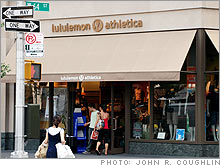VC guru on the hunt for retail's next superstarsRetail veteran and Staples founder Tom Stemberg leads a new retailcentric $300M VC fund and he's looking for some good ideas.NEW YORK (CNNMoney.com) -- Tom Stemberg is an enviable man among venture capital investors because he knows a thing or two about sniffing out a billion-dollar retailing opportunity. Stemberg is undaunted in his quest for the next retail superstars despite fears of a slowing spending climate amongst U.S. consumers.
After raising a few million dollars from venture capital titan Bain Capital, Stemberg founded a small start-up office supply company called Staples in 1986. Since then, Staples (Charts, Fortune 500) has become the world's largest office supplies chain with sales close to $20 billion. Stemberg resigned as its CEO in 2005 . He's also founded ZOOTS, the largest dry-cleaning chain on the east coast, and Olly Shoes, a children's shoe retailer. Today, as managing general partner with Lexington, Mass.-based venture capital firm Highland Capital Partners, Stemberg is looking to invest in little-known merchants with the potential to become the next Staples, or Wal-Mart or Home Depot. And he's already off to an impressive start. One of Highland Capital's investments, yoga-inspired clothing seller Lululemon Athletica (Charts), rallied 50 percent higher after the company's shares went public Friday. In a phone interview with CNNMoney.com Friday, the retail veteran spoke about niche consumer businesses that he's excited about and his concerns that a consumer spending slowdown is already underway. CNNMoney.com: Highland Capital recently created a $300 million fund to invest in consumer-related businesses. What type of concepts are you looking at? Stemberg: Today, few early-stage companies are getting funding because the big focus of private money is on large buyout investments. The company we invest in has to have a proven business model and not be a raw start-up. We invest in businesses generating between $10 to $100 million in sales. In the late 1980s and early 1990s, only huge and very successful consumer companies like Starbucks (Charts, Fortune 500), Staples, Office Depot and Costco (Charts, Fortune 500) were funded by venture capital money. We're going to focus where there's opportunity, whether it's in consumer products or services. These are companies that are too small to attract most of today's big-time investors. Q: Can you give us some examples? A: Pharmaca is the nation's leading integrated pharmacy. It sells conventional and holistic health and beauty products. They're a Boulder [Colo.]- based company with 16 stores. Blue Tulip is in the gift store business. It's a New Jersey-based company which sells eclectic gifts for every occasion. It was founded by Joseph Ellis of Goldman Sachs. [Ellis once headed the retail research group at Goldman Sachs] One has to carefully select concepts that will work. We don't want to invest in another me-too business. I won't invest in a copycat business. We also looked at hundreds of transactions in the food services industry. We're close to a couple [of deals]. Q. If these chains start to expand quickly, will they be able to compete with the big chains like Wal-Mart (Charts, Fortune 500) and Target (Charts, Fortune 500)? A: Wal-Mart and these other big retailers are so huge that it will take bigger things to excite them. These companies are no where near as large and Wal-Mart isn't going to pick on niche businesses to fuel its growth. Q: What's your outlook for the U.S. retail industry? A: The retail market overall is very soft. In my mind, some of the largest names like Wal-Mart, Home Depot and Office Depot this year will report comparable sales lower than last year. [Comparable sales measure sales at chain stores open at least a year and are a key indicator of a retailer's health] I think we're in the middle of a pretty significant slowdown. That's partly a function of Americans feeling pinched for money. But there are other overriding factors. In general, there are too many stores in America. We have more retail square footage per capita in the U.S. than in any other country in the world. Also, it's getting harder and harder for retailers to retain and motivate people to give great customer service. Q: So why are you financing the addition of even more stores to an already bloated retail landscape? A: That's because if you're selling something that's unique, then there's still room in this market for your business to become successful. |
Sponsors
|


